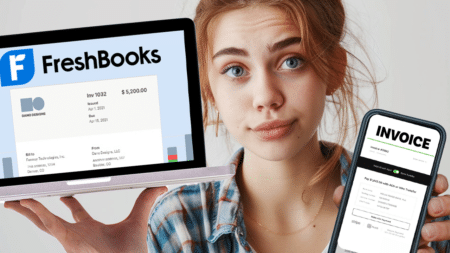Note: This article contains legal advice. We recommend you consult a lawyer before making legal decisions in your business.
Being a freelancer is increasingly common today. Whether working in the gig economy full-time or freelancing as a side hustle, people are often wearing different professional hats.
As a freelancer, protecting yourself – from liability, burdensome tax payments, cybersecurity and other threats – is critical. In this post we’ll go through some of the actions you can take to protect yourself and your business.
Challenges of Freelancing
Being a freelancer has several advantages. You can work for who you want and can set your own hours. You have the flexibility to set your own prices and determine how much you want to work.
However, there are also several challenges to being a freelancer that can make it a daunting profession, including:
- Finding Clients. As a freelancer, you need to market your services and secure clients to provide a steady income stream. It can be an intimidating challenge for freelancers who need to build a presence and reputation to secure future work
- Expanding Your Base. To grow, you’ll need to increase the number of clients you have and may need to diversify the industries and customer types in which you work
- Setting and Increasing Pay Rates. When you’re first starting out, it’s a challenge to determine fair pay rates. Charge too much and you may be priced out of certain markets. Charge too little and you’re losing opportunity. And raising your rates can be intimidating but necessary to reflect inflationary and cost-of-living shifts
- Staying Productive. With freelance work, you have tremendous flexibility, but that can mean being distracted by other demands on your time. Being productive is a challenge many freelancers face and requires discipline and strong time management
- Timely Payments. Freelancers are responsible for their own billing, which means creating and sending invoices and staying on top of clients who have bills due. This can be a stressful process, especially if clients do not pay on time
These challenges can be complex. Fortunately, there are solutions available that address some of the most fundamental challenges freelancers face. Making these decisions and acting on these opportunities can simplify a freelancer’s work and deliver productivity and profit.
Here are 4 options that you should consider:
1. Establish a Business Entity
Choosing the business structure for your business is an important step. While there are many types of structures available, most freelancers operate as either a sole proprietor or a limited liability company (LLC).
By default, all single-operator businesses are sole proprietorships. It is the simplest business structure and requires no formal paperwork to establish or register your business.
If you choose to establish a sole proprietorship, any profits or losses you have as a freelancer are recorded on your personal tax returns.
However, sole proprietors are subject to personal liability if they are sued or the subject of a court judgment. That means any parties can come after your personal assets. If a creditor asks for debts to be repaid, you are personally liable for paying back the owed amounts.
If you are looking to grow your business or seek funding, you may need a different business structure to secure financing. It’s wise to consult with a business lawyer to help determine which business entity is right for your goals and to ensure you meet all legal requirements.
An LLC is a very attractive option for freelancers. By choosing the LLC structure you in fact operate as a corporation, but have far less paperwork or formal requirements. Unlike other corporate structures, the process you go to form an LLC is usually quicker, with cheaper and less complicated, and same goes for maintaining it after you set it up.
Like with a sole proprietorship, the proceeds and losses from an LLC pass through to the personal taxes of the owner (called a member).
From a liability standpoint, an LLC makes sense. You have protection from most liabilities against the company, although negligence or wrongful conduct charges still carry some personal exposure.
2. Use Contracts
Formal contracts are a must as a freelancer. They can help you avoid any headaches during the process and provide you with legal standing should something go awry.§
Consider creating a contract with every client you work with. The contracts should spell out basic information about the scope of work and the parties involved. Working with an attorney to establish and review contract language is a prudent move, although there are many freelance contract templates available online you can use, too.
A basic freelancer contract should include:
- Legal names and addresses
- Project scope, including start and dates, timeline, description of services provided, and payment terms, schedules and rates
- Deliverables the freelancer is expected to provide
- Deadlines, factoring in time off for vacations and holidays, revisions and edits. There may also be details about what happens if the client fails to deliver you what’s needed in a timeline manner or if you miss a deadline
- Intellectual property. Typically, the client retains rights to anything the freelancer creates while the freelancer has rights to materials that a client fails to pay for
- Payment terms, including whether you’re paid by the hour or a flat rate, if there are a minimum and maximum number of hours worked, payment schedule, whether a deposit is required, whether expenses are reimbursed and the payment method
- A termination clause, which allows either party to end the relationship, which includes any kill fees to be paid
- A nondisclosure agreement (NDA), which is a confidentiality clause that prohibits either party from sharing details, proprietary information, financial details, customer lists and other private considerations
As a freelancer, you may want to include other information in writing that provides you with some boundaries, including:
- How you want clients to communicate with you (by text, phone or email) and how frequently
- Working hours, including when you are available during the week. Consider not making yourself available on weekends, after a certain time of day and stating when you will respond to messages
3. Have a Strong Online Presence
Just because you build it does not mean customers will come. You need a multichannel presence to build awareness, attract and retain customers and advertise your services. The main goal of your online presence should be to establish your expertise and knowledge of the areas in which you work.

Your online presence starts with your website. The site should detail what services you are offering and what problems those services solve for your clients.
Another section should highlight your experience and knowledge in a brief bio section. You can also include a list of clients and an online portfolio of the work you have done, if applicable.
Client testimonials, academic credentials, and content, such as blogs, white papers, downloads and videos can enhance your site.
As your business grows online, protecting your digital assets becomes crucial. Tools like business password managers are essential for securely storing and managing the many login credentials you’ll need across various platforms and services. These tools not only keep your accounts secure but also make it easier to share access with team members or virtual assistants while maintaining control over who can access what.
LinkedIn is an increasingly important place to have a strong profile. The site has become much more than just a place to post your resume. People use LinkedIn today to share content, thought leadership, opinion pieces, event invitations and news. Consider how you can leverage LinkedIn to create a strong professional presence, promote your business and get more freelance work.
Your online presence should also include regular, relevant posts on social media channels. Consider which channels your likely clients are going to frequent and concentrate your efforts there.
You do not need to have a presence on every social media channel. But if you produce video content, for example, it will be important to have a site on YouTube and TikTok.

Search engine optimization (SEO) is one area that freelancers often overlook. You want to be sure you’ve claimed your Google business profile and do keyword searches to understand what your preferred customers are looking for. You should then create content that has those keywords embedded.
Think of your social media presence as advertising, and consider investing in online ads on various platforms to drive more traffic to your website.
4. Obtain Insurance
Having insurance protects you against unforeseen circumstances that can result in lawsuits against you and your company. While the business structure you choose can play a major role in your risk, having insurance coverage protects you from a range of risks.
It might be best for you to work with an insurance broker to determine which coverage is appropriate for your business. Here are some of the most common coverages a freelancer should consider.
Professional liability insurance
Also known as errors and omissions coverage, this coverage is the most common for freelancers. It protects you from accusations from clients that the work you did on their behalf has harmed their bottom line. It can protect you if you deliver work late or incomplete, make a mistake or are negligent in doing your work.
General liability insurance
General liability policies offer blanket coverage for multiple circumstances. It can protect against accidents in the workplace, including a home office, as well as libel, slander and trademark or copyright infringement.
Cybersecurity insurance
Many freelancers rely greatly on technology, especially laptops and smartphones, to do their work. They also store business and client files in cloud-based solutions, where using cspm tools can help safeguard sensitive information. They operate over wireless networks and access and send information routinely.

Unfortunately, cybercrime is pervasive and can affect anyone, even a small freelance business. Cyberattacks can steal files or lockout systems unless a ransom is paid.
Cybersecurity insurance protects you if there’s a data breach or service disruption. The insurance can help with the costs of notifying customers, legal services, monitoring services and business interruption.
Personal insurance
When you’re employed full-time, your employer typically offers health insurance, short- and long-term disability insurance and life insurance. As a freelancer, you will need to pay for these coverages on your own.
Conclusion
Being a freelancer is a tremendous opportunity to bring your talents and expertise to clients. It’s a choice that provides flexibility and the opportunity to build something yourself.
Protecting your assets and time are important considerations when becoming a freelancer. That’s why it’s critical to make smart choices about your business structure, use of contracts, online presence and insurance coverage.
Taking those steps gives you peace of mind and confidence. With important, foundational pieces in place, you can focus your time on growing your business and building something that is valuable and compelling.
Keep the conversation going...
Over 10,000 of us are having daily conversations over in our free Facebook group and we'd love to see you there. Join us!



